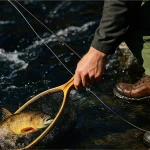In a world that rarely slows down, finding moments of true calm can feel nearly impossible. One unexpected but incredibly effective way to cultivate mindfulness is through fishing. The simple, repetitive nature of casting a line into still water, waiting patiently, and observing the rhythms of nature makes fishing a natural partner to the practice of mindfulness. Whether you’re standing by a quiet lake, wading through a gentle stream, or sitting peacefully by the ocean, fishing offers a powerful invitation to be fully present.
The Connection Between Fishing and Mindfulness
Mindfulness is the practice of bringing your attention to the present moment, free from judgment or distraction. Fishing encourages this naturally. Each step—from baiting the hook to casting and reeling—is deliberate and requires focus. Your senses become tuned to the sound of the water, the feeling of the breeze, the warmth of the sun, and the subtle tug of a fish on the line. These small details can draw your mind away from worries, work, or screens and back into the moment.
The Rhythm of Casting and Reeling
The repetitive motion of casting and reeling becomes almost meditative. Many anglers describe entering a flow state where time seems to slow, and external distractions fade away. The gentle pattern of movement helps calm the nervous system and allows the mind to relax. Even the quiet anticipation of waiting for a bite provides a valuable lesson in patience and acceptance—two key components of mindfulness.
Tuning Into Your Environment
Fishing encourages you to observe and appreciate your surroundings. Watching the patterns of ripples on the water, listening to the distant call of birds, or noticing how the light changes throughout the day helps deepen your connection to the natural world. This heightened awareness promotes a sense of calm and gratitude, both of which are essential to mindfulness. It’s about experiencing the landscape fully rather than rushing through it.
Letting Go of Control
One of the hardest but most important lessons fishing teaches is the ability to let go of control. No matter how skilled you are, you cannot guarantee a catch. Fish may bite or they may not. Weather conditions may change unexpectedly. Embracing this uncertainty helps build resilience and acceptance. Mindfulness practitioners often focus on surrendering outcomes and finding peace with the process itself, which fishing provides in abundance.
Breathing and Stillness
Fishing naturally encourages slow, deep breathing. You may notice that as you settle into the rhythm of the water and your surroundings, your breathing becomes steadier and calmer. Deep breathing activates the parasympathetic nervous system, reducing stress and promoting a feeling of relaxation. Sitting still by the water for long stretches of time allows the body to rest and the mind to clear.
Mindfulness for Every Angler
You don’t need to be an expert or catch record-breaking fish to benefit from mindfulness in fishing. Whether you’re at a small pond close to home or traveling to a distant river, the benefits are the same. It’s about the act of fishing itself—setting up your line, watching the float, feeling the breeze, and letting the world slow down around you.
Fishing as an Escape From Digital Overload
In today’s hyper-connected world, fishing offers a rare escape from screens and notifications. Few activities allow you to leave your phone in your bag and focus fully on what’s in front of you. This digital detox is one of the greatest gifts fishing can offer. Disconnecting from technology, even for just a few hours, can leave you feeling refreshed and re-centered.
Shared Mindfulness Experiences
Fishing doesn’t have to be a solitary activity to promote mindfulness. Sharing the experience with friends or family can create powerful bonding moments. Teaching a child how to cast a line, sitting quietly with a partner, or enjoying the simple rhythm of a group fishing outing allows everyone to enjoy the peaceful experience together. Silence can become comfortable and meaningful when shared in nature.
How to Practice Mindfulness While Fishing
To bring more mindfulness into your fishing trips, start by setting an intention to focus fully on the experience. Slow down and pay attention to each step. Notice the colors, textures, and sounds around you. Resist the urge to multitask or get impatient. If your mind wanders, gently bring it back to the act of fishing. Treat the process as the goal, not just the catch.
Conclusion
Fishing is much more than a hobby or a way to bring home dinner. It offers a deeply enriching opportunity to practice mindfulness, calm the mind, and reconnect with nature. In every cast and every quiet moment of waiting, there’s a chance to cultivate patience, acceptance, and presence. Whether you fish alone or with others, for sport or for relaxation, the simple act of fishing can become a meditation on the water—providing serenity and balance in a busy world.



